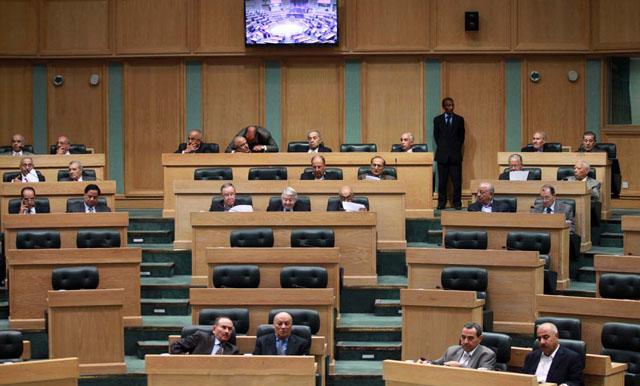You are here
Royal Decree prorogues extraordinary session
By Khaled Neimat - Sep 14,2014 - Last updated at Sep 14,2014
AMMAN — A Royal Decree was issued on Sunday proroguing the current extraordinary session as of the end of this month.
The announcement of this decision came while the Lower House was holding a session to deliberate the draft laws of the independence of the judiciary, the public private partnership (PPP) and investment.
A highlight of the extraordinary session is the controversial civil retirement draft law, which was endorsed last week in a joint parliamentary session, granting lawmakers and ministers lifetime pensions, provided they complete seven years in government service and/or as legislators.
During Sunday’s session, the MPs endorsed also the draft law on the independence of the judiciary following six sessions of deliberations.
They reversed their previous decision over electing four members to the Higher Judicial Council, the highest judicial authority in the country.
Two weeks ago, the MPs endorsed a provision in the bill allowing for the election of four additional members to the Higher Judicial Council, setting a precedent in the country’s judicial system.
However, this provision did not last when the MPs started to vote on the entire bill, as some MPs submitted a request to reopen this particular provision demanding the cancellation of the new addition.
Hence, the bill, after the MPs have endorsed it, will adopt the old mechanism of selecting members of the judicial council, under which the Cabinet nominates the candidates to the King who would then approve them by Royal Decree.
Under this bill, MPs set the age of 74 as the retirement age for top-grade judges, as the judicial authority suffers a shortage in judges; hence it would be better to keep it as stated in the draft law, rather than reducing it to a lower age, they agreed.
Also on Sunday, the MPs endorsed the draft investment law, which the Senate has sent back to the Lower House after they made certain amendments to it. The MPs passed these amendments, ending a dispute between the two chambers.
However, the dispute between the Lower House and the Senate continued over a single provision in the PPP bill, and so another joint session of Parliament will be held to resolve the issue.
The MPs approved the Senate’s decision to cancel a provision that the government obtain a prior permission from Parliament to conclude any deal with the private sector.
In his remarks during the session, MP Abdul Rahim Biqaai argued in favour of keeping the condition, as part of monitoring the government’s performance, but the head of the House Finance Committee, Kheiralla Abu Saalik, countered that by saying that such a mechanism would cause delay in these projects and, consequently, would not bring about the benefits that this bill would generate for the national economy.
Related Articles
AMMAN — A Royal Decree was issued on Monday proroguing the current extraordinary session of the Lower House as of the same day.A second Roya
The Senate on Wednesday endorsed the draft amendments to the Jordan Press Association (JPA) Law along with several other bills.
AMMAN — A Royal Decree was issued on Thursday, proroguing Parliament's extraordinary session as of September 7, a statement from the Royal C












